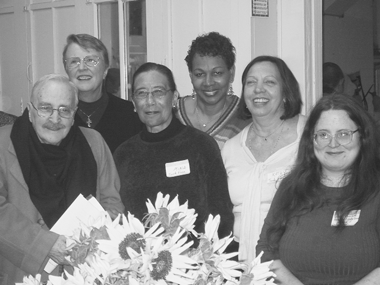St. Andrew’s Episcopal Church in Astoria provides needed beds for at-risk homeless
Some determined women, a church that takes its mission seriously, a generous donor, and dedicated staff converged to make the first shelter for homeless LGBT young people in Queens a reality at St. Andrew’s Episcopal Church in Astoria. It is called Carmen’s Place after a member of the parish who died of AIDS.
Dr. Mina Perry of the Interfaith Task Force for LGBTQ Homeless Youth, which has been successfully enlisting churches all over the city to take in these young people on at least a part-time basis, said that when she approaches churches, she tells them, “Religion is partly responsible for the homophobia that puts these kids on the street. We’re asking you to join in a solution.”
St. Andrew’s is no stranger to welcoming LGBT organizations. Reverend Louis Braxton, the pastor, said he has “a very multicultural congregation that is open and accepting” and that they had been talking about helping the homeless for a long time before the Task Force came to them. Reverend John Azzali, a former co-chair of Queens Gays and Lesbians United and affiliated with another congregation that meets at St. Andrew’s, said that SAGE Queens first met there in 1996.
The young people given shelter at Carmen’s Place will be those who have maxed out of their 90-day limit at Sylvia’s Place, run out of the Metropolitan Community Church in Manhattan. They must work on obtaining permanent housing. The facility will serve six young people under 25 at a time who are “lesbian, gay, transgender, or trans-amorous” and be supervised by Joey Scalise, 24, himself once homeless. After a six-month stay, the residents can apply for another six-month stay.
Kate Barnhart, who runs Sylvia’s Place and is director of homeless youth services at MCC, is in the process of trying to open the Marsha P. Johnson Crisis Center for this population with a $400,000 grant from the city, but is having difficulty securing a space for it. In the meantime, smaller facilities such as Carmen’s Place are being opened. While Carmen’s Place is a permanent shelter, six other parishes, including St. Bartholomew’s on Park Avenue in Manhattan, this week are beginning to offer space for up to six young people for at least a week at a time.
On hand for the opening party was Daniel Dromm, a Queens gay activist and Democratic district leader, who started Generation Q for LGBT youth in Queens six years ago “to try to prevent at-risk youth from becoming homeless, but from day one we had kids who needed shelter.”
The person who funded the new shelter, who asked to remain anonymous, spoke at the opening. “This is what I’ve wanted for so long,” he said, “a place where these young people can get on the road to self respect, employment, and independence.” This same man provided the seed money for the Hetrick-Martin Institute to open their premises and begin to function as a social service agency in 1983. He expressed his dream that young people would get the opportunity to take advantage of the vast employment opportunities in the city’s food services industry where beginners do not require specialized skills and can earn while learning about culinary arts, restaurant management, and catering services.
Peggy Borgstede, who has spearheaded the Task Force with her partner, Kathy Green, and Perry, said, “It feels great. We’ve only been in existence for seven months and never expected to be so far along so soon. The work is non-stop.”
She added that two weeks ago, 65 people, mostly gays and lesbians, came to the church basement to fix it up for the shelter.
Writer Perry Brass, who has helped with the work, said, “I got involved because I was homeless at 17, moving from Savannah to San Francisco.”
The first residents were quite open about how they ended up at Carmen’s Place. Benji Rutledge, an actor and voice-over artist, 22, had fled to New York from Indiana but became a crystal meth addict. He called Barnhart “a miracle worker” for getting him into recovery.
Blacc, 20, said he was kicked out of his house a year ago due to conflicts with his mother who would “disown me” if she knew he were gay. He tried living with a sister, but that ended when she had problems with the law. He went to Covenant House in Manhattan, but said it was “not a good experience” and he got kicked out “when I defended a friend who was being harassed.”
Blacc and Rutledge volunteered to be pioneers in the new facility begun by the Task Force in order to get the ball rolling, they explained, and “let them know that we’re not bad people.”
For information on how to help—volunteers are needed—e-mail Borgstede at Mborgstede@aol.com.
gaycitynews.com



































